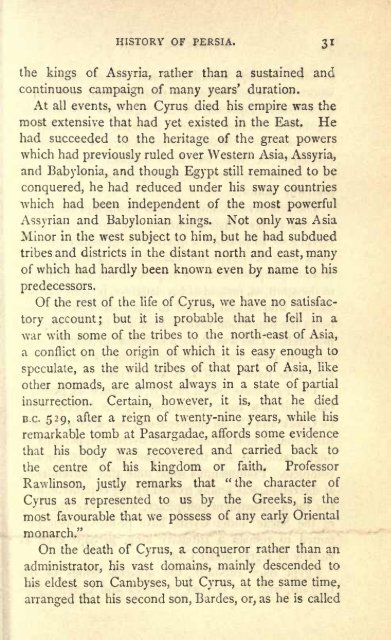Persia from the Earliest Period to the Arab
Persia from the Earliest Period to the Arab
Persia from the Earliest Period to the Arab
You also want an ePaper? Increase the reach of your titles
YUMPU automatically turns print PDFs into web optimized ePapers that Google loves.
HISTORY OF PERSIA. 31<br />
<strong>the</strong> kings of Assyria, ra<strong>the</strong>r than a sustained and<br />
continuous campaign of many years' duration.<br />
At all events, when Cyrus died his empire was <strong>the</strong><br />
most extensive that had yet existed in <strong>the</strong> East. He<br />
had succeeded <strong>to</strong> <strong>the</strong> heritage of <strong>the</strong> great powers<br />
which had previously ruled over Western Asia, Assyria,<br />
and Babylonia, and though Egypt still remained <strong>to</strong> be<br />
conquered, he had reduced under his sway countries<br />
which had been independent of <strong>the</strong> most powerful<br />
Assyrian and Babylonian kings. Not only was Asia<br />
Minor in <strong>the</strong> west subject <strong>to</strong> him, but he had subdued<br />
tribes and districts in <strong>the</strong> distant north and east, many<br />
of which had hardly been known even by name <strong>to</strong> his<br />
predecessors.<br />
Of <strong>the</strong> rest of <strong>the</strong> life of Cyrus, we have no satisfac-<br />
<strong>to</strong>ry account; but it is probable<br />
that he fell in a<br />
war with some of <strong>the</strong> tribes <strong>to</strong> <strong>the</strong> north-east of Asia,<br />
a conflict on <strong>the</strong> origin of which it is easy enough <strong>to</strong><br />
speculate, as <strong>the</strong> wild tribes of that part of Asia, like<br />
o<strong>the</strong>r nomads, are almost always in a state of partial<br />
insurrection. Certain, however,<br />
it is, that he died<br />
B.C. 529, after a reign of twenty-nine years, while his<br />
remarkable <strong>to</strong>mb at Pasargadae, affords some evidence<br />
that his body was recovered and carried back <strong>to</strong><br />
<strong>the</strong> centre of his kingdom or faith. Professor<br />
Rawlinson, justly remarks that "<strong>the</strong> character of<br />
Cyrus as represented <strong>to</strong> us by <strong>the</strong> Greeks, is <strong>the</strong><br />
most favourable that we possess of any early Oriental<br />
monarch."<br />
On <strong>the</strong> death of Cyrus, a conqueror ra<strong>the</strong>r than an<br />
administra<strong>to</strong>r, his vast domains, mainly<br />
descended <strong>to</strong><br />
his eldest son Cambyses, but Cyrus, at <strong>the</strong> same time,<br />
arranged that his second son, Bardes, or,<br />
as he is called

















